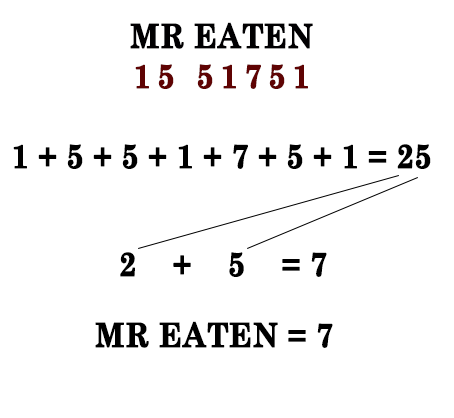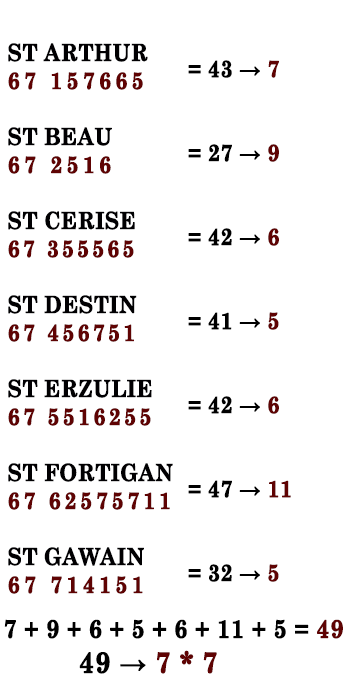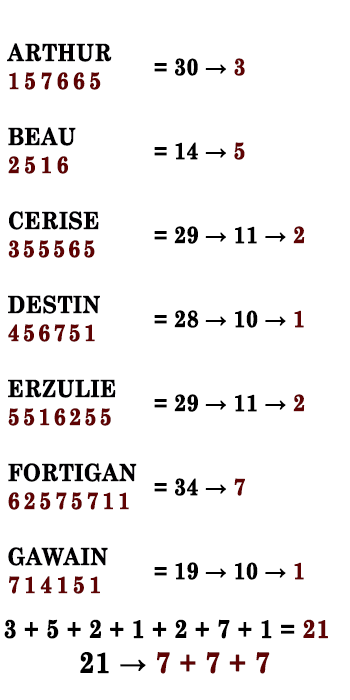Abstract:
By applying an alphanumberic coding system with a seven motif to the names of the seven False Saints of Seeking fame, we arrive at a collective value of 49, which simplifies to seven sevens. Given the convoluted nature of the whole endeavor and its relatively subjective structure, it is unlikely that this is intentional, but it wouldn’t be the biggest stretch considering the depths of Alexis Kennedy’s knowledge. No it… would actually be a pretty big stretch. I’m kinda sure this wasn’t intentional. But maybe it was. Huh? Huh? Who knows, huh, who even knows?
The Actual Content:
Let’s begin with numerology. More specifically, gematria. The latter is, most essentially… [quote=]…an Assyro-Babylonian-Greek system of alphanumeric code/cipher… that assigns numerical value to a word/name/phrase in the belief that words or phrases with identical numerical values bear some relation to each other or bear some relation to the number itself as it may apply to Nature, a person’s age, the calendar year, or the like. Similar systems, some of which were derived from or inspired by Hebrew gematria, have been used in other languages and cultures, i.e. Greek isopsephy, Arabic abjad numerals, and English gematria.[/quote] Cool stuff, fun to mess around with, it keeps me busy during particularly tedious lectures. I’m only an occultist by the most generous, non-committal definitions, so I can’t give much more than the above overview. Suffice it to say that at some point in the past two years I got into metaphysics as a hobby and settled on a derivation of this fellow’s frameworks which, entirely by chance, happened to be a base-seven system. To make it more apparent:

In this way, it’s a straightforward matter to turn a word or words into a number of varying size. My preference (not an uncommon one) is to simplify the results to a certain extent. For example:

Through tinkering I arrived at a limit of 13. That is, keep simplifying until the result is 13 or less, that final number being the value of the word/phrase. This isn’t a hard-and-fast rule; I tend to pick an overarching concept and shoot to find a way to nudge it into yielding the result I want, as in the above. Some would call that cheating, but keep in mind that any strictly prescribed system of metaphysical thought probably just… well, it probably can be traced back to the narcissism of some patriarchal figure in the tradition’s history and who needs that, huh? Not this guy. So anyway, take the above example: It is inarguable that MR EATEN ought to equal 7. That’s the number, after all. That’s what this is all about. I got lucky, I didn’t have to tweak anything, abiding by the 7 motif with a cutoff of 13 yielded the correct result. I discovered this while doodling during a sociological statistics seminar. At that point I could either be Freed From the Name and actually take notes on coding surveys for studying urban populations, OR I could try to apply the aforementioned system to other Seeking-related things. Naturally I went with the latter, to initially underwhelming effect:
As you can see, the values of each candle are all over the place, they don’t necessarily tell us anything, but when the simplified values are added up we get 49. Glorious, glorious 49. Seven sevens. Another way of saying that is that the average value of each candle is 7. If this isn’t to your liking, it is possible to adjust as follows: remove "ST" from each candle, set the cap at a single digit, resulting in:
I’m less partial to this one, personally, but since it still yields a very pertinent result, I figured I’d toss it out there.
Discussion:
A note on the sixth candle. I’m aware that Alexis once pointed out that the inconsistency between its being named "Forthigan" and "Fortigan" is intentional. However, adding the "h" to either series of calculations renders them meaningless. "Forthigan" poses a stumbling block while "Fortigan" fits perfectly. I (sincerely) doubt this sheds any light on the matter and if there have been developments I missed in which one spelling is given precedence over the other, do inform me.
If I’ve made a careless error that invalidates the whole thing, my response is "oops" and "I’m very sorry". I checked it three times but seven would have probably been more prudent. Frankly, I do not care for numbers. Can’t pretend I’m 100% confident in even the rudimentary operations above.
In conclusion, nothing is actually learned here, but boy, didn’t we have a swell time?
edited by Saint-Just on 10/22/2017


